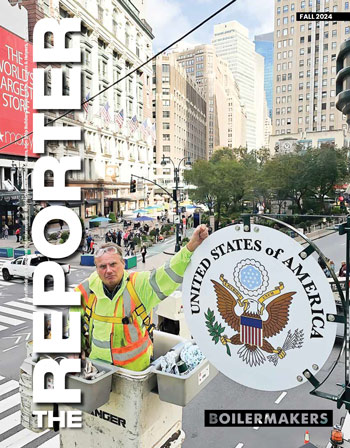Maintaining the high standards of registered apprenticeships is vital to the success of our trade, as well as many others.
Arthur Kling, L-13, cuts out a short piece of replacement tube, called a “pup,” during the waterwall exercise in 2014 at the Boilermaker National Apprenticeship competition, where he captured top honors. With the Biden Administration ending IRAPs, union apprenticeship programs such as BNAP remain the gold standard in training.
The building trades’ two-year fight against the Trump Administration Department of Labor’s Industry Recognized Apprenticeship Program, also known as IRAPs, ended in February when the Biden Administration eliminated the program. Unions across the board were against these pseudo apprenticeships that were nothing more than an attempt at allowing non-union companies in the construction trades to shortcut training to increase their profits. If enacted, they would have lowered the standards of industry-specific testing and proven union apprenticeships, all which have high standards and demonstrated safety.
The construction industry relies on the proven union apprenticeship model to train workers because union apprenticeships produce workers who have more safety awareness, higher skill levels and greater productivity. In a statement praising the rescinding of IRAPs, NABTU, North America’s Building Trades Unions, stressed the importance of upholding the registered apprenticeship model used successfully for generations.
“The construction industry’s integrity relies on the well-structured and regulated format of registered apprenticeships to help recruit and retain workers through progressive wage increases, appropriate apprentice-to-journey worker ratios, quality assurance assessments, and instructor eligibility prerequisites.”
Boilermakers National Apprenticeship Coordinator Mark Wertz also hailed the decision to end IRAPs.
“The BNAP commends the Biden Administration’s suspension of the IRAP. The Boilermaker trade, like many others, requires a highly skilled workforce. Maintaining the high standards of registered apprenticeships is vital to the success of our trade, as well as many others.”
In addition to ending IRAPs, the current administration also brought back the DOL’s Advisory Committee on Apprenticeships, which provides needed input from industry experts.
“We applaud the decisions by the Biden-Harris Administration to both eliminate Industry Recognized Apprenticeships and bring back the Department of Labor’s Advisory Committee on Apprenticeship, which provides much needed industry-based input on policy, quality assurance standards, and equitable enforcement,” said NABTU’s President Sean McGarvey.






